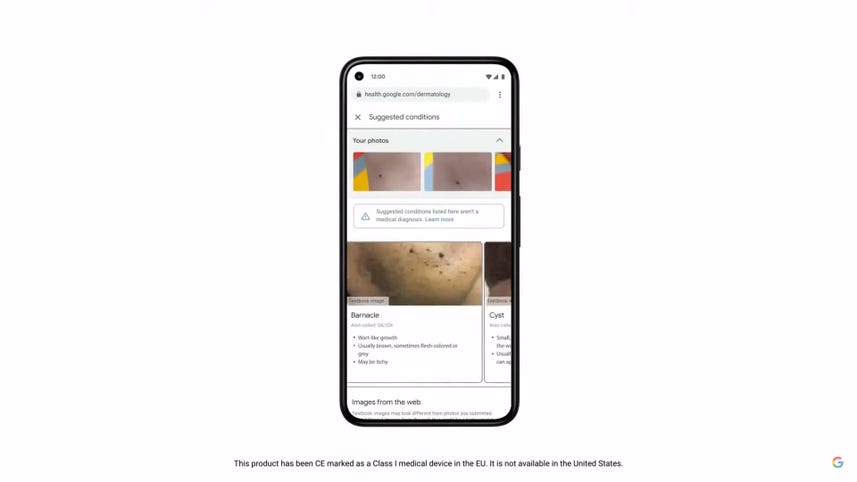
Today I want to bring you inside to see how our recent advances in image recognition are helping to solve some of the world's big health challenges.
Let's start with breast cancer.
A diagnosis that one in eight women will face in their lifetime.
mammograms can help catch breast cancer earlier.
But half of all women experience a false alarm across a decade of screening.
So we've been working to make mammography better.
Last year our research demonstrated AI's potential to analyze screening mammograms with accuracy similar to clinicians.
And now we're collaborating with Northwestern medicine on an investigative device research study.
To better understand how AI can apply to the breast cancer screening process.
Let's hear why this matters.
[BLANK_AUDIO]
[MUSIC]
When we found out Grandma had breast cancer, it was in the late 90s.
And it wasn't something that anyone talked about.
[MUSIC]
So my first mammogram Cram was nerve racking,
[MUSIC]
Waiting for the results.
Every thought runs to your head.
What if they find something?
[MUSIC]
It was the worst feeling.
One of the greatest anxieties about having mammography is the wave It may take radiologists days, sometimes weeks to get through the list of mammograms that need to be read.
This is a national problem.
We don't have enough people doing what we need to do.
With the research study that we're doing with Google, we're using artificial intelligence that scans the mammogram image It helps flag patients that may need additional imaging.
I get an email that says the patient has been flagged and if I agree we take the patient and they take more pictures right away.
We're just at the tip of the iceberg in terms of what we can do with artificial intelligence.
We would like to see that we are getting patients faster through the system.
If we can show that then we can potentially change radiologists operations in such a way that they can prioritize patients that need care first, so it will be very exciting to see the results of this study.
[MUSIC]
This is a great example of how we're learning if AI could support clinicians in their work to triage patients.
At Google, we want everyone to have the highest quality care.
Technology can and should help close the equity gap.
That's why we're working to bring this technology to bear on important global health challenges, from diabetic retinopathy to our new work to improve tuberculosis detection using image recognition.
On chest x rays.
We also believe AI can assist you in your daily health.
People come to Google search every day to ask questions about their health.
For example, we see billions of queries each year related to dermatologic issues.
This is no surprise because derm conditions affect about 2 billion people globally.
There are not enough specialists to meet the need.
And so we wondered how can AI help when you're searching and asking, what is this?
Meet our AI powered dermatology assist tool, a class one CE marked medical device that uses machine learning to help find answers to common Derm conditions right from your smartphone or computer.
From your phone just upload three different photos taken from various angles of the skin, hair or nail issue that you want to learn about, and answer some basic questions about your symptoms.
Ai model handles the rest.
In a matter of seconds you will have a list of possible matching dermatologic conditions.
And then we can help you get relevant information to learn more.
It seems simple, but developing an effective AI model for dermatology requires the capability to interpret millions and millions of images, inclusive of a full range of skin types and tones.
When available, this tool will be accessible from your browser and cover 288 conditions, including 90% of the most commonly searched derm related questions on Google.
We're working to make it available to consumers on Google search in the EU.
As early as the end of this year.
We've just looked at ways we're applying AI to support people and caregivers everywhere.
But health isn't just driven by medical care.
It's also about our social and emotional well being.
And that's where staying connected comes in.
To find out how Google is helping, me pass it back to Sunda.
[MUSIC]